- Home
- John Cheever
The Journals of John Cheever
The Journals of John Cheever Read online
Praise for
THE JOURNALS OF JOHN CHEEVER
“Heartrending.… A daring contribution to American letters.”
—The New York Times
“Elegant and alarmingly frank.”
—Newsweek
“Astonishing.… [A] vivid record of a delicate mind in torment.… A masterpiece of not just literary but human self-examination.”
—The Philadelphia Inquirer
“Presents Cheever’s inner life in what might be called a final draft: concise, lucid, mocking, and brimming with implications.”
—The Nation
“Intense.… A train ride through scenery that is bright and dark by turns.”
—Los Angeles Times
“Luminous.… Exquisitely written.… [Cheever] takes us on a journey to the depths, but we could not want a better guide.”
—Chicago Tribune
THE JOURNALS OF JOHN CHEEVER
John Cheever was born in 1912. He is the author of seven collections of stories and five novels. He won the National Book Award for The Wapshot Chronicle, and the National Book Critics Circle Award and the Pulitzer Prize for The Stories of John Cheever. He received the Howells Medal for Fiction and the National Medal for Literature. He died in 1982.
Also by John Cheever
NOVELS
OH WHAT A PARADISE IT SEEMS (1982)
FALCONER (1977)
BULLET PARK (1969)
THE WAPSHOT SCANDAL (1964)
THE WAPSHOT CHRONICLE (1957)
STORIES
THE STORIES OF JOHN CHEEVER (1978)
THE WORLD OF APPLES (1973)
THE BRIGADIER AND THE GOLF WIDOW (1964)
SOME PEOPLE, PLACES, AND THINGS THAT WILL NOT APPEAR IN MY NEXT NOVEL (1961)
THE HOUSEBREAKER OF SHADY HILL (1959)
THE ENORMOUS RADIO (1953)
THE WAY SOME PEOPLE LIVE (1942)
FIRST VINTAGE INTERNATIONAL EDITION, DECEMBER 2008
Copyright © 1990, 1991 by Mary Cheever, Susan Cheever, Benjamin Cheever, and Federico Cheever
All rights reserved. Published in the United States by Vintage Books, a division of Random House, Inc., New York, and in Canada by Random House of Canada Limited, Toronto. Originally published in hardcover in the United States by Alfred A. Knopf, a division of Random House, Inc., New York, in 1991.
Vintage is a registered trademark and Vintage International and colophon are trademarks of Random House, Inc.
Portions of this work were originally published in The New Yorker.
The Library of Congress has cataloged the Knopf edition as follows:
Cheever, John.
The journals of John Cheever / John Cheever—1 st ed.
p. cm.
1. Cheever, John—Diaries. 2. Authors, American—20th century—Diaries.
PS3505.H6428Z467 1991
818′.5203B—dc20 91052728
eISBN: 978-0-307-79029-3
Book, design by Dorothy Schmiderer Baker
www.vintagebooks.com
v3.1
CONTENTS
Cover
About the Author
Other Books by This Author
Title Page
Copyright
Introduction
The Late Forties and the Fifties
The Sixties
The Seventies and the Early Eighties
Editor’s Note by Robert Gottlieb
INTRODUCTION
WHEN JOHN CHEEVER died on June 18, 1982, he left—in his journals—a vast, unedited, unpublished body of work. It is from these twenty-nine looseleaf notebooks that Robert Gottlieb has fashioned the book that follows.
Most of the people I know reacted with enthusiasm when portions of the text ran in The New Yorker, but a few were hurt and bewildered by what they found. Those who broached the subject with me had two questions: Did John Cheever really want this material published? And if so, why?
I sympathize with this distress. I found reading some parts of this work to be exquisitely painful. But my father wanted his journals published. I know because he told me. I also think I know why.
The journals were not initiated with publication in mind. They were the workbooks for his fiction. They were also the workbooks for his life. He’d buy a miniature looseleaf, fill it up, then buy another. The notebook in use would sit on or near his desk. The lined sheets of filler were easy to distinguish from the standard, yellow foolscap he used for his stories and novels.
These pages—feverishly typed, with floating caps, misspellings, and cross outs—were nevertheless readable, and so they presented an extreme temptation. We were not supposed to read them. I don’t recall his exact instructions, but they were sufficiently explicit, and expressed with an edge of menace.
Therefore I was surprised when he first began to hint about their possible publication. This was in December of 1979. I had left my first wife and come to stay with my parents. I thought of my return as joyous, something approaching the triumphal. In his journals I later learned that my father’s feelings were not unmixed. He wrote: “On Saturday morning our son Ben, after a week in a spiritual retreat where he got fucked, has left his wife and returned home, for it seems only a few hours.”
A couple of days later he was resigned to the prospects of a long visit. “My son is here. I think that we do not know one another; I think it is our destiny that we never will. I observe, in a comical way, that he does not flush the toilet. He observes that I snore. Another son returns tomorrow. I feel that I know him better, but wait and see.” And then, a little ruefully: “Some part of loving one’s children is to part with them.”
I stayed for months. And he seemed to enjoy my company. (In the journals I begin to appear again as a “beloved son.”) We talked a lot. He wanted to talk about the journals. He had sent the notebooks out by twos to various distinguished libraries. I was surprised by this, and envious. He wanted to know if the librarians would be scandalized. I don’t know if they were scandalized, but their response was disappointing to him in some way, because after a certain amount of time had passed, he’d retrieve the books.
He wondered aloud to me if his journals had any value as a document. He asked me repeatedly what I thought. I said I didn’t know. I said I assumed that there would be interest in anything he had written. I said I couldn’t judge, because I’d never read them.
Then one night in January, he presented me with one of the notebooks. He asked if I would mind looking at it.
We were in the dining room. I sat in a chair and read from the journal he had given me. He sat in another chair and watched. He asked what I thought. I said I thought that the journal was interesting; I thought it beautifully written. He asked me to read some more. I did read some more. At one point I looked up, and I could see that he was crying. He was not sobbing, but tears were running down his cheeks. I didn’t say anything. I went back to reading. When I looked up again, he seemed composed.
I told him I liked it.
He said he thought that the journals could not be published until after his death.
I agreed.
Then he said that their publication might be difficult for the rest of the family.
I said that I thought that we could take it.
He wanted to know if I really thought there would be interest.
I said that young writers would certainly be interested. Then I asked if he wanted them published, and he smiled. He seemed almost gleeful about the prospects.
The subject came up quite a few more times in the weeks that followed. He kept asking me if I really thought there would be interest. I kept saying there would be.
After that, I was allowed to read the journals. And I did. But
it wasn’t fun. This was not the witty, charming man in whose guest bedroom I had been sleeping. The material was downbeat and often mean-spirited. There was a lot about homosexuality. I didn’t quite get it, or maybe I didn’t want to get it. I was also surprised at how little I appeared in the text. I was surprised at how little any of us appeared, except perhaps my mother, who was not getting the sort of treatment that leads one to crave the limelight.
THIS BRINGS us to the second question: Why would anyone want this material published?
By 1979 John Cheever had become a literary elder statesman. “I’m a brand name,” he used to say, “like corn flakes, or shredded wheat.” He seemed to enjoy this status. He must have suspected that the publication of the journals would alter it. His public image was that of a courtly English gentleman who lived in an antique farmhouse and raised bird dogs. His later books had expressed a candid interest in other facets of life, but it was certainly conceivable that this interest was purely intellectual. Few people knew of his bisexuality. Very few people knew the extent of his infidelities. And almost nobody could have anticipated the apparent desperation of his inner life, or the caustic nature of his vision. But I don’t think he cared terribly about being corn flakes. He was a writer before he was a breakfast food. He was a writer almost before he was a man.
In notes and letters many writers of astonishing talent will let down their guard, and one can see them blundering along like the rest of us, searching clumsily for the cliché. This didn’t happen to my father. “I know there are some people who are afraid to write a business letter because they will encounter and reveal themselves,” he used to say with disdain. I can see now that the person he was disdaining was himself. He couldn’t write a postcard without encountering himself. But he’d write the postcard anyway. He’d encounter himself, transform himself, and you’d have a hell of a postcard.
He saw the role of the serious writer as both lofty and practical in the same instant. He used to say that literature was one of the first indications of civilization. He used to say that a fine piece of prose could not only cure a depression, it could clear up a sinus headache. Like many great healers, he meant to heal himself.
For much of his life he suffered from a loneliness so acute as to be practically indistinguishable from a physical illness. “Loneliness I taste,” he wrote in early 1979. “The chair I sit in, the room, the house, none of this has substance. I think of Hemingway, what we remember of his work is not so much the color of the sky as it is the absolute taste of loneliness. Loneliness is not, I think, an absolute, but its taste is more powerful than any other. I think that endeavoring to be a serious writer is quite a dangerous career.”
He meant by his writing to escape this loneliness, to shatter the isolation of others.
I recall him telling me he had received a thankful letter from a man who had read the novel in which Coverly Wapshot dreams that he has had sex with a horse. The passage had relieved this admirer of some burden of anxiety; it had lessened his loneliness. This pleased my father immensely. So he meant with the journals to continue this process: he meant to show others that their thoughts were not unthinkable. He meant to do good works, but there was also an element of pleasure in his anticipation of the publication of such an inflammatory body of work.
By the time we talked in 1979, he was a lot less hard on himself. The remorse he felt about his bisexuality had been almost unendurable when he was a young man. By 1980, he could write: “In the thirties and forties men seemed to fear homosexuality as the early mariners feared sailing off the end of the ocean in a world supported on a turtle’s back.”
A simpleton might think that bisexuality was the essence of his problem, but of course it was not. Nor was alcoholism. He came to terms with his bisexuality. He quit drinking. But life was still a problem. The way he dealt with that problem was to articulate it. He made it into a story, and then he published the story. When he discovered that he had written the story of his life, he wanted that published, too. An I think the prospects of publication somehow lessened the fear of death. Suddenly death was an opportunity.
MY MOTHER is the literary executor of my father’s estate, but she has always been guided by the desire to please her children and to honor the memory of her husband. We were all involved in the decision to publish the journals. The project is therefore our responsibility. It is not, however, our book. First and foremost it is John Cheever’s book, but after that it belongs to its editor. Robert Gottlieb was my father’s editor at Knopf. It was he who convinced my somewhat skeptical father that there was indeed a need for the collected “Stories” that appeared in 1978, and he who made the selection. The book was a best-seller and won the Pulitzer Prize. But, more than that, it was almost proof of the validity of my father’s life and art.
Robert Gottlieb gave this book its shape, its continuity, and somehow he did it without distorting the nature of the life portrayed. My family watched this process with awe, acting primarily as a back-up team. We suggested the inclusions which expanded the six excerpts from The New Yorker into this book. We also provided assistance in establishing chronology. But most of our work has been as an exercise in restraint. We did not interfere. We did nothing to protect our father. We did nothing to protect ourselves. We stood aside. My sister, Susan, my brother, Fred, and I did most of the backing up; my mother did most of the standing aside. Our job took time, hers courage.
BENJAMIN H. CHEEVER
THE LATE FORTIES AND THE FIFTIES
In middle age there is mystery, there is mystification. The most I can make out of this hour is a kind of loneliness. Even the beauty of the visible world seems to crumble, yes even love. I feel that there has been some miscarriage, some wrong turning, but I do not know when it took place and I have no hope of finding it.
Thinking for a week about Leander, Betsey, and Eben without writing a word, without making any progress. And so I see all my plans—the voyage to Genoa, etc.—collapse. Is there something intrinsically wrong with these three, that I can’t grasp them? Thinking this morning to discard the opera.
Yesterday was rainy and deeply overcast. At four B. and I walked up Holbrook Road to the K.s’. The clearing wind had begun to blow. As the overcast was displaced with brilliance and color, as more and more light poured into the valley, the hour seemed tumultuous and exalting. Backgammon and gin.
Skating one afternoon at the Newberrys’. The end of a very cold winter day. The ice, contracting in the cold, made a noise like thunder. Walking up the frozen field to the house we could hear it thundering. We went back that night. There was no one else on the pond. The G.s’ dog was barking. There was no moon and the ice was black. It seemed, skating out into the center of the pond, that the number of stars I could see was multiplied. They seemed as thickly sown as a rush of snowflakes. As I skated back to the end of the pond, the number seemed to diminish. I was confounded. It could have been the whiskey and the wine. It could have been my utter ignorance of cosmology.
•
To church; the second Sunday in Lent. From the bank president’s wife behind me drifted the smell of camphor from her furs, and the stales of her breath, as she sang, “Glory be to the Father, and to the Son, and to the Holy Ghost; As it was in the beginning, is now, and ever shall be, world without end.” The Old Testament dealt with should the Father eat bitter grapes; the New with an eye for an eye and a tooth for a tooth. The sermon with the doctrine of Incarnation. The rector has a plain mind. If it has any charms, they are the charms of plainness. Through inheritance and cultivation he has reached an impermeable homeliness. His mind and his face are one. He spoke of the impressive historical documentation of Christ’s birth, miracles, and death. The church is meant to evoke rural England. The summoning bells, the late-winter sunlight, the lancet windows, the hand-cut stone. But these are real fragments of a real past. World without end, I murmur, shutting my eyes, Amen. But I seem to stand outside the realm of God’s mercy.
I would like not to be vi
ndictive or narrow. I would like to avoid phony compassion. Thinking of the midsummer night, “Parlons français,” the drunkard said. I see that this is small. I see in the five-and-ten-cent store yesterday that my descriptions of Betsey’s pleasure are small. It stinks of peanuts and cheap candy. A love song drifts over from the phonograph-record department. The salesgirl is elaborately painted. You buy what you want; and you leave. The street is sunny. The blind Negress on the bus says, “I’m by myself. I’m by myself at home now. I’m by myseff on the street. I’m by myseff. I’m by myseff so much I’m like a statue. I’m by myseff like a statue all the time.” She shakes her portable radio. “She ain’t working. I’ve had her on since Ninety-sixth Street and she ain’t made a sound. I guess I’ll have to get her fixed again. She wears out quick.” The man on the train. “Well, I guess I look cheerful enough, but I’m on my way to the hospital. They just called me from the office to tell me that C. fell out of an apple tree and broke her leg in two places. They called me at the office a few minutes ago and I rushed over here and took the train.…”
•
These Westchester Sunday nights. There has usually been a party on Saturday night so you wake up with a faint hangover and a mouth burned by a green cigar. The clothes you have left in a heap on the floor smell of stale perfume. You take a shower. You put on old clothes. You drive your wife to church and your children to Sunday school. You rake the leaves off the flower bed. They are too wet to burn. You put a chemical fertilizer on the lawn and examine the bulbs. The Rockinhams, on their way to a Sunday-lunch party at the Armstrongs’, shout their good mornings from the sidewalk. “Isn’t it a glorious day; glorious, glorious.” Your wife and children return from church, still in their stiff clothes. You have a drink before lunch. Sometimes there are guests. You take a walk; you rake more leaves. The children scatter to play with other children. The southbound local, the train that aunts, uncles, and cousins who have gone into the suburbs for lunch take home; the train that cooks, maids, butlers, and other menservants take into town for their half holiday. Sunday is almost over.

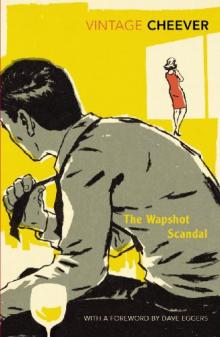 The Wapshot Scandal
The Wapshot Scandal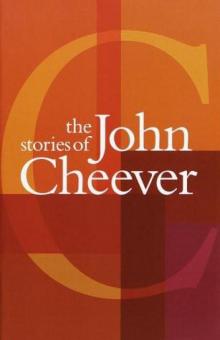 The Stories of John Cheever
The Stories of John Cheever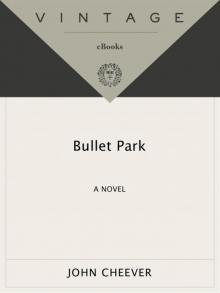 Bullet Park
Bullet Park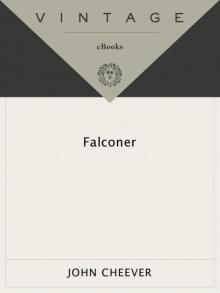 Falconer
Falconer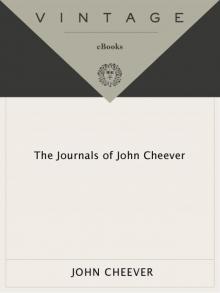 The Journals of John Cheever
The Journals of John Cheever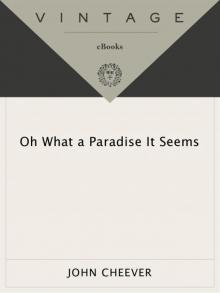 Oh What a Paradise It Seems
Oh What a Paradise It Seems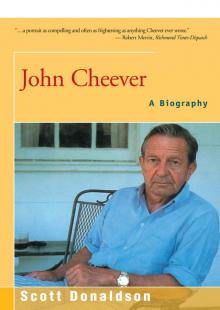 Scott Donaldson
Scott Donaldson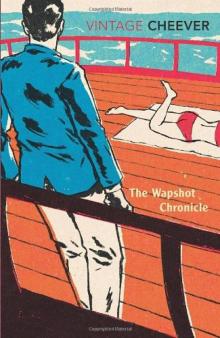 The Wapshot Chronicle
The Wapshot Chronicle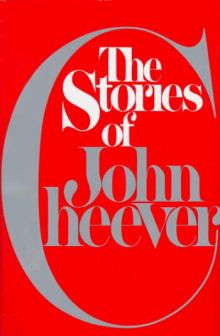 The Stories of John Cheever (1979 Pulitzer Prize)
The Stories of John Cheever (1979 Pulitzer Prize)